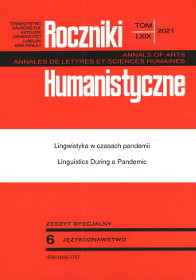Worse the Remedy Than the Disease? Arguments and Values in Controversies about Vaccination Against Covid-19
Abstract
An interdisciplinary approach involving linguistics, rhetoric, and argumentation theory helps reveal how people argue their opinions and decisions. Although the pandemic is a common experience, its risks are perceived in different ways. For some, the real threat is Covid-19 and the remedy is vaccination. For others, however, the real risk is the vaccine and the “remedy” is refusal to get vaccinated. Justifying their opinions on the subject, Italian Internet users refer to common values (such as life, health, responsibility, etc.). However, since Internet users diagnose risks in different ways, they make use of shared values in differing ways. In this paper, the views of those for and against vaccination are analyzed from three complementary perspectives. The first one concerns the differences in which people conceive of various values. The second one shows how, using the same topoi, pro- and anti-vaccine advocates create different hierarchies of values that are fundamental to their respective decisions. Finally, the third one explores differences in the ways values are used in various argumentation schemes used in disputes on vaccination.
References
Aristotele. Organon. Analitici secondi – Topici – Confutazioni sofistiche. Traduzione a cura di Marcello Zanatta, UTET, 1996.
Capaci, Bruno. «The Antidote of Fear. The Rhetorical Genres as a Link Between Literature and Society. Examples from Italian Literature». Res Rhetorica, vol. 4, n. 1, 2017, pp. 32-46.
Capaci. Bruno. «Il paese spaesato. Cenni di analisi retorica e argomentativa sul covid-19». DNA – Di Nulla Accademia. Rivista di studi camporesiani, 2020, vol. 1, n. 1, pp. 80-96.
Eco, Umberto. Le forme del contenuto. Bompiani, 1971.
Forni, Guido, Alberto Mantovani, Lorenzo Moretta, Giovanni Rezza (a cura di). I vaccini fanno bene. Perché dobbiamo credere nella scienza per difenderci da virus e batteri. La nave di Teseo, 2020.
Gambarelli, Gaia. «Affidabilità e fiducia nella comunicazione dell’incertezza. Il ruolo del Medico di Medicina Generale». DNA – Di Nulla Accademia. Rivista di studi camporesiani, vol. 1, n. 2, 2020, pp. 38-48.
Haidt, Jonathan. The Righteous Mind: Why Good People Are Divided by Politics and Religion. Penguin Books, 2012.
Macagno, Fabrizio «The Acts and Strategies of Defining». What do we know about the world? Rhetorical and Argumentative Perspectives, ed. Gabrijela Kišiček e Igor Ž. Žagar. Pedagoški inštitut, 2013, pp. 109-130.
Maffettone, Sebastiano. Il quarto shock. Come un virus ha cambiato il mondo. LUISS University Press, 2020.
Oergel, Maike. Zeitgeist. How Ideas Travel. De Gruyter, 2019.
Passaro, Elvira. «La retorica del contagio da Boccaccio al Coronavirus: i casi della peste del ’300, del ’500 e del ’600 tra fonti storiche e letteratura». DNA – Di Nulla Accademia. Rivista di studi camporesiani, vol. 1, n. 1, 2020, pp. 17-37.
Passaro, Elvira. «Retorica, etica e scienza al tempo del Covid-19. La persuasione dei modelli di allocazione dei vaccini». DNA – Di Nulla Accademia. Rivista di studi camporesiani, vol. 1, n. 2, 2020, pp. 57-70.
Perelman, Chaïm, e Lucie Olbrechts-Tyteca. Trattato dell’argomentazione. La nuova retorica. Traduzione di Carla Schick e Maria Mayer con la collaborazione di Elena Barassi, Einaudi, 2001.
Pernot, Laurent. La rhétorique de l’éloge dans le monde gréco-romain. Vol. I-II. Institut d’Études Augustiniennes, 1995.
Piazza, Francesca. «Metafore di guerra e guerra alle metafore. Sull’uso del lessico militare per parlare della pandemia di Covid-19». DNA – Di Nulla Accademia. Rivista di studi camporesiani. vol. 1, n. 2, 2020, pp. 87-96.
Poliseno, Antonio. Valori e filosofia di valori. Armando Editore, 2006.
Puzynina, Jadwiga. Język wartości. Wydawnictwo Naukowe PWN, 1992.
Puzynina, Jadwiga. Wartości i wartościowanie w perspektywie językoznawstwa. Polska Akademia Umiejętności, 2013.
Walton, Douglas, Chris Reed e Fabrizio Macagno. Argumentation Schemes. Cambridge University Press, 2008.
Zagarella, Roberta M. «Persuasione, fiducia e reputazione nel discorso medico-scientifico», The Future of Science and Ethics, vol. 1, n. 2, 2016, pp. 97-104.
Copyright (c) 2021 Roczniki Humanistyczne

This work is licensed under a Creative Commons Attribution-NonCommercial-NoDerivatives 4.0 International License.





